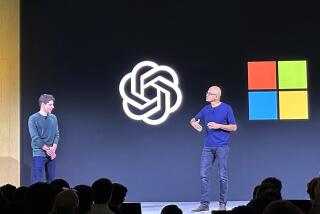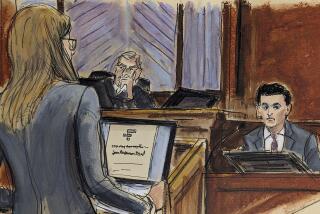Microsoft Assails Claim It Sought to Divide Market
- Share via
WASHINGTON — The lead attorney for Microsoft Corp. on Thursday challenged the government’s claim that the software giant sought to illegally divide the Internet software market with archrival Netscape Communications Corp.
Using e-mails, company memos and other evidence, Microsoft lawyer John Warden elicited increasingly testy responses from Netscape Chief Executive James Barksdale, as he pressed his cross-examination of the government’s star witness for a third day in the antitrust case.
Warden sought to portray Netscape, a leading Internet software developer, as the instigator of overtures seeking an investment from Microsoft as well as its help in exploiting the Internet software market. Warden maintained that Microsoft never crossed the line into anti-competitive conduct.
“Is this anything more than just a difference of opinion going on between you and Microsoft about where the line is?” Warden asked Barksdale.
Microsoft, Barksdale replied, “stepped across the line.”
Warden’s cross-examination of Barksdale came as U.S. District Judge Thomas Penfield Jackson admonished Microsoft not to prolong his fast-track trial schedule by dragging out the questioning of witnesses. It also occurred as the government said that it intends to air videotape of some of the eight hours of Microsoft Chairman Bill Gates’ pretrial deposition.
Gates is not a witness in the landmark case, but the showing of his video testimony in court will give tens of millions of Americans an opportunity to see the government question the nation’s richest man about his company’s business practices. The tape will be released to the media and the public next week.
The government has sought to portray a controversial June 21, 1995, meeting as evidence of Microsoft’s alleged anti-competitive practices. The government and Netscape contend that Microsoft suggested teaming up with Netscape as part of a proposed scheme to illegally divide the market for Internet software.
But Warden grilled Barksdale, trying to get him to agree that his version of the June 21 meeting was an invention of Netscape co-founder Marc Andreessen.
“The only fair conclusion that can be reached is that Marc Andreessen invented or imagined a proposal to divide the market and that you and your company have signed on to that invention or imaginary conclusion in order to assist in the prosecution of this case, right?” Warden boomed at Barksdale.
“I absolutely disagree,” Barksdale shouted. “That’s absurd!”
At another point, Warden waved a memo purporting to represent a chronology of contacts and meetings between Microsoft and Netscape in late 1994 through mid-1995 and asked why it made no mention of Microsoft’s seeking to divide the market with Netscape.
“This detailed chronology submitted to the Department of Justice doesn’t say anything about a proposal to divide the market, does it?” Warden asked.
“No sir,” Barksdale admitted, before Warden cut off a further response.
Netscape general counsel Roberta Katz said outside the courthouse that Barksdale would not have shared any concern about alleged Microsoft anti-competitive practices with the author of the memo--Silicon Valley attorney Gary Reback--because Reback was Netscape’s outside counsel at the time and represented several other high-tech companies that were potential rivals.
Warden’s questioning of Barksdale is expected to end Monday and the parties will take a break Tuesday to introduce Gates’ videotaped deposition.






